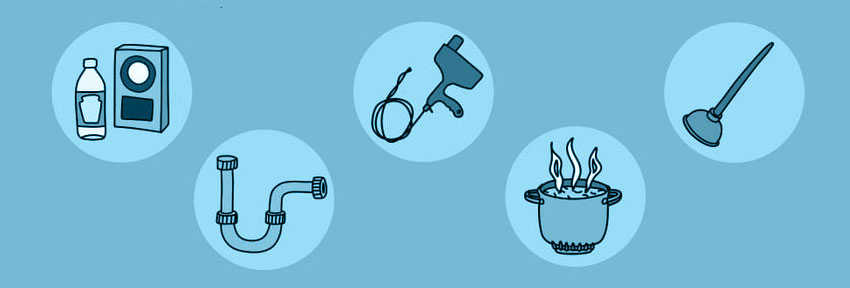How to Avoid Blocked Drains at Home

Discover effective solutions for preventing blocked drains with our comprehensive guide on 'How to Avoid Blocked Drains at Home'. Blocked drains are a common household problem, often leading to frustrating plumbing issues, unpleasant odors, and potential water damage. Our expert tips will help you maintain clear and functional drains throughout your home. Learn about the importance of mindful waste disposal, the benefits of using drain strainers, and the necessity of regular drain maintenance. Whether you're dealing with a kitchen sink, bathroom drain, or outdoor pipes, our guide offers practical advice and simple steps to keep your plumbing system running smoothly. Protect your home from the inconvenience and expense of blocked drains with these easy-to-follow strategies
Avoiding Blocked Drains - Tips and Tricks
The first drain cleaning knowledge you can have is to prevent significant blockages in your drains. Clogs and blockages are the number one reason for major drain sewer line repairs, and they are entirely avoidable.
To start, do not put anything down the drain that your system is not designed to handle. Remember that while toilet paper dissolves in water over time, other types of paper do not. Napkins, sanitary products, and paper towels will remain whole in the sewer or drain system and eventually clog your sewer line.
If you have a child, make sure they do not put any small objects in the drain, such as toys, food, or clothing. Even when something flushes down the drain, there is a possibility it will get stuck between your home and the final sewer outlet.
In the kitchen, avoid putting any grease or other food waste down the drain. Only use the garbage disposal for things that it can safely break up and run the faucet at the same time as you grind the food. It will ensure that it completely breaks down whatever you place inside before it is flushed through. Grease, in particular, is a major problem in pipes as it coats the lining, and other items can stick to it.
Prevention Tips:
The best way to keep drains clear is to limit what you put in them. Here is a list of products that should not be placed into a drain;
- Dental floss - these tangle up in your drain and turn them into big clogs.
- Coffee grounds - coffee grains are very grease and can clog drains.
- Grease, oils, or fats - grease on the liner on your drain creates significant blockages in your main drain and kitchen drain.
- Hair - it is hard to avoid having hair enter a drain, but we recommend doing your best to prevent it from happening.
- Baby wipes - they don't dissolve and cause main line blockages.
- Tampons
- Rubber gloves, condoms, or balloons
- Paint, paint solvents, nail polish, nail polish remover, motor oil and transmission fluid, prescription medications - These products will not block your drain but are very harmful to the environment.
- Cat litter, including the flushable kind.
- Meat, poultry, and fish bones, as well as eggshells— garbage disposals aren't meant to grind bones or eggshells.
- Toys - We love our little ones and try our best to avoid toys ending up in your toilets.
How to Keep Your Drains Clean
- Clean your drains once a week. Pull out the pop-up stopper in your bathroom sink, remove any debris in the drain, and rinse the plug before reinserting it. Remove the drain stopper from your shower or tub drain and use a bent wire or hair-catching brush to remove hair and other debris.
- Flush your drains weekly. Fill your tub with hot water and then drain it. Run hot water down the shower drain at the end of each shower.
- Deep clean your tub drain once a month. Remove the overflow plate and raise the pop-up assembly to reach the spring or rocker arm. Remove any hair or other debris and rinse the pop-up assembly well before replacing it.
- Use a bacterial drain cleaner once a month to maintain your drains. Unlike chemical drain cleaners, bacterial drain cleaners are biodegradable and non-corrosive so that they won’t damage your pipes. Preventing sink, tub, and shower clogs before they occur is the best way to keep drains clear year-round. All it takes is some regular cleaning and a little maintenance.
- Collect Grease — Don't Dump It. One of the worst things you can pour down your drain is grease. Warm grease runs down your drain until it cools in the pipe, where it congeals to start forming a clog. The best solution is to avoid pouring any grease or oil down your drain. Just keep a jar handy to collect the grease, and throw it into the trash when it gets full.
Scheduled Drain Maintenance
About Once A Week
- In your shower or bathtub drain, add a hair-catching wire to clear out any debris that has accumulated. You can purchase hair-catching plastic wires at your local hardware store.
- Clean the stoppers in the bathroom or kitchen sink, remove any debris.
About Once a Month
- Clean your garbage disposal with some table salt and grinding up a few cups of ice. It removes the grease from the sides of the garbage disposer. Then fill up your sink and flush the drain.
- Full up your sinks with cold water and release the pressure to clear any debris in the drains.
Don't Wait for a Mainline Blockage
If you have a clogged sewer line every year or two, don't just keep getting it cleaned. Most sewer service companies will 'scope' the line to see what's causing the problem. That entails sending a remote camera down the line for a visual inspection.
The recurring issue could be tree roots entering through clay tile joints, a partially collapsed pipe, or even rotted-out cast iron that allows the soil to fall into line and create a blockage. It's worth paying to find out the cause and get it fixed rather than hassling with frequent sewer backups and sewer-cleaning bills.
Get A Quote 514-316-1043

